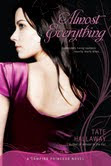I’ve ended my novels the same way for years. I rush headlong toward a climax, and then when all the various threads are all tied up, I stop writing. Invariably, some critic (either professional or amateur) says that the book feels rushed or as if it’s missing something. Comments like this used to leave me confused and baffled. I mean, you have to quicken the pace the closer to get to the big, final showdown, don’t you? And, as long as all the bits are nicely tidied up at the end, you’re done, right?
I used to think so, and, in the end, I think that the answer comes down to a matter of style. Because, after all, for every person who complained, there were probably dozens who thought the book ended just fine. Certainly, my editors have never asked me to change the way I do endings, so they must be “correct” in at least one sense of the word.
But, I think I’ve figured out what so many people have that reaction to the way I tend to end books: readers don’t like to leave stories. As writers, sometimes, I think we’re so driven towards writing those precious words “The End” that we forget about the experience a reader has during the final chapters of a book. The headlong rush is great, but when all the bad guys are defeated a reader wants to take a moment and catch their breath and know that the characters that they’ve come to know and love (hopefully!) are going to be all right in the end.
I don’t usually give this moment to my readers. I tend to stop writing when the action is done. It’s very much, “Ta-Dah! Full stop.” I get why a reader might feel a little whip lashed by that, even though I still tend to resist the idea of the “wrap-up” chapter. It reminds me too much of the “let’s all stand beside the captain’s chair and make some lame joke at Spock’s expense” wrap-up of the Old Trek episodes. The “morning after when everything is okay again” chapter always felt to me (as a reader, but even more so as a writer) as contrived.
I’ve come around, however. I think about what Charlotte’s Web might have been, for instance, if the last chapter was “Final Triumph” where, after Wilber’s life is saved and the egg sac is safely on its way back to the farm, Charlotte dies alone. That’s definitely the end of the whole character arc and conflict that White set up for Wilber and Charlotte. Even some minor character’s issues, like Templeton, the Rat’s, are resolved. Everything is tidy. She dies. The end.
Except White knows better than to leave us there, with a sob in our throats. He gives us a condensed vision of the winter, and brings us around to the next spring when Charlotte’s babies are born, grow, and leave Wilber to say good-bye again. Though three of her daughters stay, White tells us that no one is ever a match for Charlotte, and, in effect gives the reader several small chances to slowly let go of a beloved character and to be filled with the sense that although her death seems unfair, she will be remembered fondly by the one who loved her best, and that’s all any of us can ever hope for, and that’s all right. Sadder than sin, but all right.
Readers need an opportunity to let the story go. I think I have been ending my novels too quickly, without a good sense of that need.
And so, without further ado, good-bye.
Good-bye. See you tomorrow.



1 comment:
Also, goodbye.
See you later.
Ciao.
I mean it, I'm done now.
And then...
Post a Comment